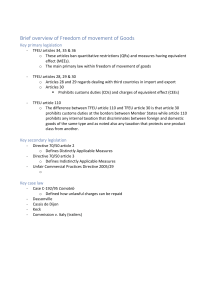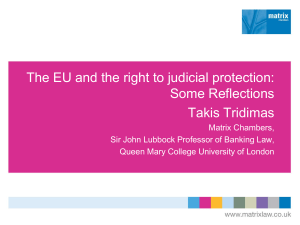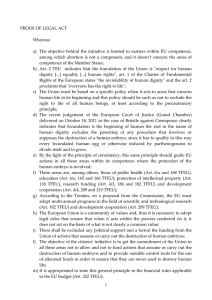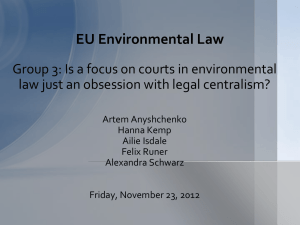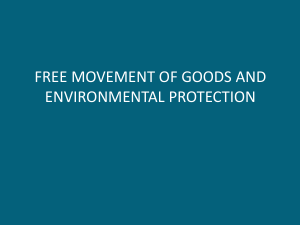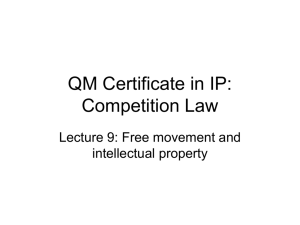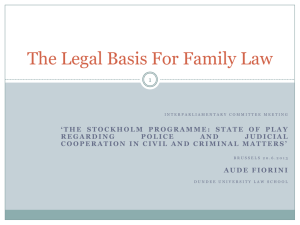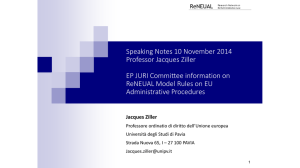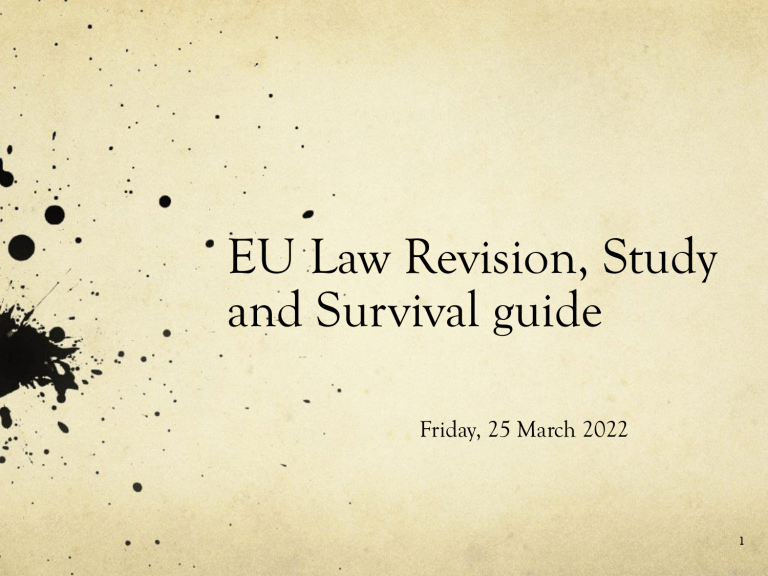
EU Law Revision, Study and Survival guide Friday, 25 March 2022 1 LAW2110 EXAM PAPER: Basic requirements You MUST answer 3 Qs = You MUST answer the seen Q + also answer 2 unseen Qs out of the 5 unseen Qs made available to you All Qs carry equal marks but a HIGHER STANDARD of knowledge, analysis and presentation will be expected in the answer to the seen Q than to the unseen Qs in the exam LAW2110 EXAM PAPER: Online related aspects Duration of Exam: You will have 5h00 to complete the exam paper Word limits: max of 1,200 words per Q but remember: FOCUS NEEDS TO BE ON QUALITY, NOT QUANTITY Materials permitted: EU law exam will be a “take home/open book” exam = you will sit the exam remotely and you may (but do not have to) consult textbook, module handbook, slides, etc. Our advice: Do revise for the EU law exam unseen Qs as YOU WOULD NORMALLY as having access to your textbook and/or notes and/or online sources WILL NOT HELP YOU if you have not previously and properly revised/understood the module. Pitfall to avoid: Looking for answers in your textbook/notes/slides on the day of the exam. You will NOT find them unless you have properly revised the module and you will find yourself having run out of time notwithstanding the extended duration of the Date/time of the first LAW2110 EU law “take home” exam in 2021-2022 The LAW2110 EU Law exam paper will be released in the usual way on 20 April 2022 at 09:00am UK time Your answers must be submitted via Turnitin on the same day by 02:00pm UK time We will provide students with an answer book template document, including a cover page, ahead of the release of the exam paper Reminder: Extra time is given to account for the time required to download the paper, type the answers and upload the answers = you are not expected to spend your 5 hours answering the unseen questions = quality always better than quantity Key revision topics ① EU rules governing the free movement of goods (i.e. rules & case law dealing with FISCAL & NON-FISCAL restrictions) ② EU rules (including EU secondary legislation: e.g. Dir. 2004/38, Reg. 492/2011) & case law relating to the free movement of persons (EU citizens, EU workers, EU self-employed, EU providers of services and their family members) ③ History of the EU (main EU Treaties since 1951) & EU Institutions (composition, functions and powers of main EU institutions: European Council, Council, Commission, Parliament & Court of Justice) ④ Sources of EU Law, EU Legal Instruments (Regulations, Directives, Decisions) & Legislative Process (ordinary legislative process) ⑤ Key principles of EU Law: Direct effect & Primacy of EU Law ⑥ EU System of Judicial Remedies: Preliminary ruling + annulment action + enforcement action Layout of exam paper (20 April 2022) PART A (seen Qs) Q1: Problem Q PART B (unseen Qs) Q2: Essay Q Q3: Essay Q Q4: Essay Q Q5: Problem Q Q6: Problem Q EU Law revision tips General tips PLAN AHEAD: put together a 7-day revision schedule + revise one module per day or half day + have realistic goals (see next slide) o Revise actively (reading through your notes is not good enough) CREATE HABITS/ESTABLISH A ROUTINE: Do similar tasks daily at same time/same location Summarise: prepare your own 3-4p max summary per key topic (see key topics slide) | this summary should be based on ‘key points’ available in module handbook + lecture slides + textbook PRIORITISE: Focus on important tasks and deal with most difficult tasks when you are at your best (e.g. morning) Once done with summaries/rereading your notes, practice writing plans and full answers to previous exam questions AVOID DISTRACTIONS; INTERRUPTIONS; PROCRASTINATION by turning off Wi-Fi on your device(s) NB. Seen Q must be prioritised after general revision period (see below for specific advice on seen Q) TAKE REGULAR BREAKS: Take a 10-mn break after every hour of revision & do not revise/work excessively (no more than 8h of revision per day) Last 24 hours: Avoid any last-minute intensive revision session as you do not want to be tired on the day of the exam! Example of 7-day revision schedule once teaching is over Monday Tuesday Wed Thurday Fri Sat EU Law Tort EU Law Tort EU Law Tort Read and summarise module topic no 1 in week 1 / Module topic no 4 in week 2 Optional module or seen Q Topic no 2 in week 1 / Topic no 5 in week 2 Topic no 3 in week 1 / Topic no 6 in week 2 Sun Enjoy a nice brunch with friends! NB. Seen Q can be researched/ prepared after Easter break Criminal Law Optional module or seen Q Criminal Law Optional module or seen Q Criminal Law Go see a scary movie DURING THE EXAM o START BY READING the questions carefully to AVOID irrelevant and/or incomplete answers o Do not write anything during the first 5 minutes and instead take a deep breath, read & select the questions to answer and CAREFULLY PLAN YOUR TIME o Quickly move on if you get stuck on a question (or any particular aspect of a question) & MAKE SURE TO ANSWER THE COMPULSORY NUMBER OF QUESTIONS! o Explain yourself if you are not able to answer all aspects of the question rather than leaving the marker wondering why a particular aspect is not covered/analysed General advice for the Seen Q Reminder: Seen Q is in essence just a lengthy problem Q Key point: The facts are all important and application of relevant law (e.g. Treaty provisions; legislative provisions; case law) to the facts is essential. Pitfalls to avoid: Offering a purely abstract essay Not separating the different issues clearly Excessive repetition Raising irrelevant points of law Poor written style General organisation Do not put pen to paper until you are clear on the following issues: (1) FACTS: You must have a precise understanding of the facts, since facts determine the relevance of any legal points you make later. Fact identification and organisation is an important legal skill. (2) LEGAL ISSUES: Draw relevant legal topics/issues from the facts + consider the order in which you should address them (order and organisation of your lecture slides should help here) (3) RELEVANT LAW: Identify the correct law applicable to each main factual problem (while doing so, also identify supporting authorities) Structuring your answer Apply the IRAC formula or any variation of that method (http://en.wikipedia.org/wiki/IRAC) For additional and useful advice, see Prezi presentation by Steven Vaughan on “answering problem questions: Law”: http://prezi.com/3aiflevclr3y/answeringproblem-questions-in-law/) Joe, a French national, is passionate about exotic gardens and royal history, and applies to the French government to legally change his name to ‘King Joe’. After changing his name in February 2021, he meets and falls in love with David, an American national who is studying law at Maastricht University, and King Joe decides to move to the Netherlands to be with him. Upon arriving in the Netherlands in March 2021, King Joe plans to open a garden centre specialising in seasonal exotic plans, called ‘Four Seasons Exotic Garden Centre’. He convinces David to put his law degree on hold to instead help him with the Garden Centre. King Joe applies for a business licence to operate the ‘Four Seasons Exotic Garden Centre’ but is refused, as (1) in the Netherlands it is illegal for anyone except the Monarch to use the title ‘King or Queen’ and so his name cannot be registered on any official document; (2) it is a legal requirement that anyone operating a garden centre to have a qualification in horticulture (or equivalent) which King Joe does not have; and (3) King Joe speaks Dutch with a French accent which would make it difficult for consumers to understand the care instructions for their exotic plants. In the process of appeal against the decision not to grant him a licence, King Joe receives further bad news. The Dutch Ministry of the Interior issues a deportation order against David as he is no longer in the Netherlands on a study visa, as he has withdrawn from his course and intends to work for King Joe. The Ministry states that David is not a family member of King Joe and so cannot rely on his EU law rights. Advise King Joe and David as to their rights under EU Law. N.B. You should not consider the application of domestic Dutch immigration law. Seen Q outline answer Key legal issues: 1/ use of title ’King or Queen’; 2/ qualification in horticulture to run a garden centre; 3/ linguistic proficiency in national language to run a garden centre; 4/ deportation of non-EU partner (David) justified on account that the partner would not be a family member of an EU citizen (King Joe in this case) Relevant Law: 1/ Article 21 TFEU and ECJ Case C208/09 Sayn-Wittgenstein; 2/ Article 49 TFEU and associated case law covered in class; 3/ Case law developed covered in class in relation to workers (esp ECJ Case C-379/87 Groener /Article 45 TFEU which can be applied by analogy to self-employed persons/Article 49 TFEU; 4/ Directive 2004/38 Seen Q outline answer Assessment (reminder: 4 key legal issues were distinguished previously): 1/ students should consider the application of relevant case law (Sayn-Wittgenstein) and whether this constitutes a restriction on the right of free movement under Article 21 TFEU. They should then consider whether the restriction could be justified on the basis of public policy considerations. The argument within Sayn-Wittgenstein of protecting the principle of equal treatment does not apply, and so students should consider the proportionality of the law: e.g. calling someone ‘King’ does not indicate that they are usurping royal status. 2/ Students should consider whether this constitutes a restriction (yes), but whether it nevertheless does not fall foul of Article 49 TFEU as it is the same condition as applies to all nationals of the Netherlands. For full consideration, students should also consider whether the restriction is also nevertheless justified by overriding reasons of general interest, for instance on grounds of public policy, public security or public health; and whether it is proportionate. 3/ students should consider whether this is discriminatory (yes), and can argue principle from relevant case law under Article 45 TFEU (but should ensure to clarify that King Joe is not a worker under Article 45 TFEU, and Article 49 TFEU is applicable). Students should consider whether it is a proportionate requirement of operating a garden centre for the licence-holder to speak without a French accent. 4/ Students should identify that David does not fall under any category of family member listed in Article 2 Directive 2004/38, however, the must then consider whether David may be considered a beneficiary under Article 3 Directive 2004/38. Students should consider whether 7 months (at the time of the EU law exam) constitutes a ‘a durable relationship, duly attested’ General approach to answering (unseen) essay questions Read the question carefully. Identify the area(s) of law in the question. Is the question based on a quotation? If so, which issues does the quotation raise? Please make sure to engage with quotation to get the best possible mark Write a rough plan of your approach to answering the question, including the relevant Treaty Articles, secondary legislation and case law of the CJEU + some personal analysis/comments. Example of ESSAY-Q Having regards to both its composition and powers, critically analyse whether the Commission effectively promotes ‘the general interest of the Union’ as required by Article 17(1) TEU. Your answer should particularly focus on the Commission’s power of initiative in the legislative process and explain how the Commission interacts in this context with the Council of the EU and the European Parliament. Introduction: Students would be expected to give an overview of the EU institutional framework and its historical evolution until Lisbon Main analysis: 1/ Students are expected to first offer a descriptive account of the Commission’s composition and powers. They should explain for instance why we have one Commissioner per EU Member State, their role, the term of their mandate, how they are appointed and can be dismissed, etc. (all relevant information available in the handbook/slides/textbook) 2/ In the second part of their answer, students are expected to focus on the following two points directly mentioned in the the second part of the Question: i) Commission’s power of initiative in the legislative process (a broad description of ordinary legislative procedure is expected here) and ii) Commission’s role as ‘guardian of the Treaties’ (a broad description of the Commission’s power to initiate annulment actions and infringement actions is expected here) Brief concluding remarks can then be offered on the European Commission’s key role in the broader EU’s institutional framework REMINDER: all of the info required to satisfactorily answer this essay question can be found in the module handbook / slides & textbook General approach to answering (unseen) problem questions Read the question carefully Identify the legal area(s) covered by the question Write a rough plan of your approach to answering the question before drafting your answer & consider using the IRAC method to structure your answer Your answer must cite & analyse: Relevant Treaty provisions (TEU, TFEU, EU Charter provisions) and EU legislative provisions (i.e. provisions from relevant EU regulations and/or EU directives) Relevant CJEU case law (NB: it is enough to cite judgments using either the case number or the name of the applicant) Example of PROBLEM-Q Introduction: General overview of the notion of EU internal market and EU ”four freedoms” before briefly explaining key rationale underlying EU free movement law (preventing national protectionism /discrimination on grounds of nationality/origin) before outlining briefly what free movement of goods legally entails in EU law and two types of national trade barriers one may encounter (fiscal versus nonfiscal barriers to trade) Alberto runs a business specialising in the sale of Italian food products in Italy. During the pandemic, he switched to selling products online only, but has encountered the following difficulties as he tries to expand his business outside of Italy: Relevant Law: Students should summarise key legal principles one may derive from the ECJ case law regarding CDs and CEEs (Art 30 TFEU); ECJ case law regarding discriminatory internal taxation (Art 110 TFEU) and ECJ case law regarding non fiscal barriers to trade = quantitative restrictions and MEQRs (Art 34 TFEU) (a) Lithuania requires all sun-dried tomatoes to be charged €1 for every mile they travel from the point of production to the point they are sold in order to encourage a reduction in environmental impact; Application: (a) Alberto’s sun-dried tomatoes have been subject to fee (tax) for every mile travelled to the market. This should be examined in light of the case law relating to Art 110 TFEU and not Art Art 30 TFEU. In this instance, there is a clear breach of Art 110 TFEU. While ostensibly non-discriminatory as applying to all sun-dried tomatoes, the measure is distinctly applicable, as it more negatively impacts on products imported from outside of Lithuania. Students should argue as to whether environmental impact constitutes an objective justification. (b) French law requires that olive oil bottles sold in France must clearly indicate the country of origin; (c) In Finland it is illegal to advertise wine online, regardless of origin, but this prohibition does not apply to other types of alcoholic beverages such as beer or vodka, which are produced locally. Advise Alberto as to the legality of the EU law issues arising regarding the free movement of goods with respect to (a) the Lithuanian environmental charge; (b) the French labelling requirement and (c) the Finnish advertising prohibition. (b) French law also provides that olive oil must clearly highlight the country of origin = French labelling requirement should be assessed in light of Art 34 TFEU | See Commission v. UK; Commission v. Ireland; Commission v. Germany | Product characteristic post Keck may be said to be liable to reinforce national preferences even though requirement applies to all olive oil producers. (c) In Finland, it is illegal to advertise wine, regardless of origin, online but advertising of other types of alcoholic beverages is fine = Finnish advertising prohibition = key issue is to assess whether this falls within scope of Art 34 TFEU or whether it constitutes a selling arrangement falling outside of scope of this Treaty provision | Keck is to be discussed and it should be argued that Keck’s conditions are not met as indirectly discriminatory measure whose effect is exclusively felt by wine producers, none of which are established in Finland. Protectionist intent can be clearly deduced from the arbitrary distinction made between wine and for instance beer or vodka, which are produced in Finland contrary to wine.
